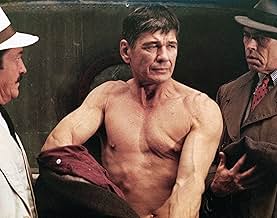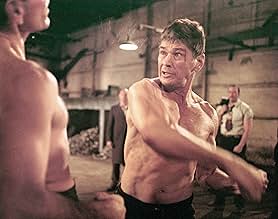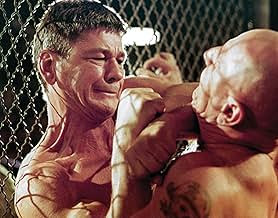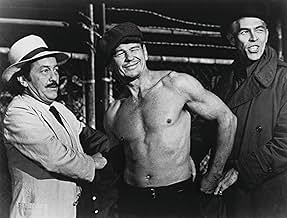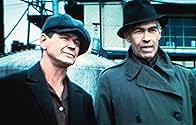IMDb-BEWERTUNG
7,2/10
12.909
IHRE BEWERTUNG
Die Abenteuer eines Landstreichers wurden während der Depressionszeit in New Orleans zum illegalen Preisboxer.Die Abenteuer eines Landstreichers wurden während der Depressionszeit in New Orleans zum illegalen Preisboxer.Die Abenteuer eines Landstreichers wurden während der Depressionszeit in New Orleans zum illegalen Preisboxer.
Margaret Blye
- Gayleen Schoonover
- (as Maggie Blye)
Empfohlene Bewertungen
Hard Times is one of Charles Bronson and Walter Hill's best films. This movie is rugged and has a great feel. Bronson looks in great shape in the film and the direction from Hill is terrific. In the genre of street-fighting pictures, this one ranks as one of the best.
A desperate hobo boxes to make some extra money in the Depression. No love story, no cute little kids, no happy ending, no redemption. Just a hard man doing what he has to in order to survive. But on his terms.
To understand why HARD TIMES is a masterpiece, compare it to other films from around this time.
BONNIE AND CLYDE, THE STING, and PAPER MOON were all massive box office hits, set in the Depression. All three movies "strain" for a sense of desperate characters in a dog-eat-dog world, but every one of them cops out with Hollywood glitz and glamor. Here's giggly Warren Beatty pretending he knows what it's like to be poor. And here's Faye Dunaway, the dead-end girl, wearing scrumptious couture while she robs banks. Here's Robert Redford, the ultimate preppy blonde pretty boy, delicately hobnobbing with down-to-earth "Negroes" and glowing with his own virtue. Here's Ryan O'Neil, tough as nails and a real fighter, but hey, it's okay -- he's got a cute little girl along for the ride! One close up of Charles Bronson's face takes you to a place no other Depression picture dares to go. The ugly violence and the hopelessness in this film are so real that they actually build up the character even more than Bronson's natural authority and physical presence. It's the perfect vehicle for the perfect star.
Bronson is enough -- but there's so much more. James Coburn as the manager Speed, so dishonest yet completely likable and in his own way a real hero. Maggie Blye and Jill Ireland, both sexy and authentic as Depression women -- Jill too sickened by failure to ever love again, Maggie too aware of how short life is to ever let a minute go by without a laugh. Either one of them could wipe the floor with "Bonnie" from Bonnie and Clyde. Strother Martin as Poe, the dope addict cut man who adds his own humor, sadness and resignation to a movie utterly packed to the brim with memorable characters.
This is the most powerful and honest movie ever made about hard times.
To understand why HARD TIMES is a masterpiece, compare it to other films from around this time.
BONNIE AND CLYDE, THE STING, and PAPER MOON were all massive box office hits, set in the Depression. All three movies "strain" for a sense of desperate characters in a dog-eat-dog world, but every one of them cops out with Hollywood glitz and glamor. Here's giggly Warren Beatty pretending he knows what it's like to be poor. And here's Faye Dunaway, the dead-end girl, wearing scrumptious couture while she robs banks. Here's Robert Redford, the ultimate preppy blonde pretty boy, delicately hobnobbing with down-to-earth "Negroes" and glowing with his own virtue. Here's Ryan O'Neil, tough as nails and a real fighter, but hey, it's okay -- he's got a cute little girl along for the ride! One close up of Charles Bronson's face takes you to a place no other Depression picture dares to go. The ugly violence and the hopelessness in this film are so real that they actually build up the character even more than Bronson's natural authority and physical presence. It's the perfect vehicle for the perfect star.
Bronson is enough -- but there's so much more. James Coburn as the manager Speed, so dishonest yet completely likable and in his own way a real hero. Maggie Blye and Jill Ireland, both sexy and authentic as Depression women -- Jill too sickened by failure to ever love again, Maggie too aware of how short life is to ever let a minute go by without a laugh. Either one of them could wipe the floor with "Bonnie" from Bonnie and Clyde. Strother Martin as Poe, the dope addict cut man who adds his own humor, sadness and resignation to a movie utterly packed to the brim with memorable characters.
This is the most powerful and honest movie ever made about hard times.
Great role for Bronson.
Compare Bronson's fighting style with almost any other fight movie like Kirk Douglas in 'Champion' or Stallone in the 'Rocky' series. Bronson slips and ducks his opponent's punches like a real fighter does, putting as much effort into not getting hit as he does hitting the other guy. Any fighter taking the hits that most movie boxers take would be unconscious or dead in a matter of minutes, and even sluggers like Rocky Marciano and George Frazier were constantly moving, never offering a good target.
This depression era movie is similar in flavor to the Lee Marvin Ernest Borgnine vehicle 'Emperor of The North'. Both movies have unsentimental, tough, taciturn heroes who communicate more with glances and gestures.
Compare Bronson's fighting style with almost any other fight movie like Kirk Douglas in 'Champion' or Stallone in the 'Rocky' series. Bronson slips and ducks his opponent's punches like a real fighter does, putting as much effort into not getting hit as he does hitting the other guy. Any fighter taking the hits that most movie boxers take would be unconscious or dead in a matter of minutes, and even sluggers like Rocky Marciano and George Frazier were constantly moving, never offering a good target.
This depression era movie is similar in flavor to the Lee Marvin Ernest Borgnine vehicle 'Emperor of The North'. Both movies have unsentimental, tough, taciturn heroes who communicate more with glances and gestures.
With this, his first directing job, Walter Hill showed his tendency for archetypal characters (see the later "The Driver" - where the characters didn't even have proper names - and, of course, "The Warriors"). Here, Bronson is 'The Fighter'...Coburn is 'The Hustler'...Martin is 'The Addict-Medic'...and so forth. Bronson's final opponent is simply named 'Street' while the big guy who damages The Hustler's automobile with a big hammer is just called 'Hammerman.' They all present striking, impressive figures; you don't easily forget any of them. They stride or shuffle through a page of history, in this case Depression-era New Orleans, nicely atmospheric as shown here. Times are hard. People need to be hard, as well. One way to make good money is in pick up fights, street fights in warehouses, on docks or, in one case of rich atmosphere, in the bayou.
Chaney, aka The Fighter, as played by Bronson, true to director Hill's method of archetypes, first appears on a slow moving train from places unknown. We never learn anything of his past history, even though there's about 50 years worth there. We learn only of his incredible hitting ability in the current time frame of the story's progression. In a way, Bronson was born to play this role: he's certainly not a young man here but he looks so tough we have no trouble believing he can wipe out men 20 years his junior. With the archetype of The Fighter, the story plays out like some Depression times fable, the tale of a mystery man or warrior arrived in a city to astonish all the onlookers with his formidable fighting abilities. The fights themselves are quite memorable; the viewer has the good fortune to witness these with the shouting hordes of betting men from the safety of a couch at home. We're a part of the spectacle, a guilty participant in a brutal spectator sport, a much more gritty version of modern boxing, and we wouldn't have it any other way.
The rest of the cast is super: Coburn was never better as Speed 'The Hustler' and Chaney's front-man/manager. It's mostly through him that we hear all the phrases and quips common to those places & times, and Coburn delivers them all with a gusto & panache few are capable of. You really believe he was born as the 19th century was ending, grew up in the twenties and adjusted to the Depression accordingly. You'll always remember his retorts to the bayou residents and his last insult about fish to Gandil, the bigshot. Speed and Chaney need each other and their relationship is another strong point; Speed is all about the money, sure, but you sense he has a strong admiration for Bronson's power and quiet nobility (this is confirmed at the end). As Poe, Strother Martin created & added another indelible character to the long list on his resume. Other actors would've been saddled with some of the odd dialog he has to deliver, but he just breezes through it like a song. Glover (Crispin's dad) is also very good as a loan shark, as is McGuire as the rich Gandil. Mention should also be made of the top two fighters (Tessier & Dimitri). The film needed characters who could pose a threat to Chaney and these two looked just as tough. Now if only Chaney would explain more about those 'in-betweens'... but he doesn't say much.
Chaney, aka The Fighter, as played by Bronson, true to director Hill's method of archetypes, first appears on a slow moving train from places unknown. We never learn anything of his past history, even though there's about 50 years worth there. We learn only of his incredible hitting ability in the current time frame of the story's progression. In a way, Bronson was born to play this role: he's certainly not a young man here but he looks so tough we have no trouble believing he can wipe out men 20 years his junior. With the archetype of The Fighter, the story plays out like some Depression times fable, the tale of a mystery man or warrior arrived in a city to astonish all the onlookers with his formidable fighting abilities. The fights themselves are quite memorable; the viewer has the good fortune to witness these with the shouting hordes of betting men from the safety of a couch at home. We're a part of the spectacle, a guilty participant in a brutal spectator sport, a much more gritty version of modern boxing, and we wouldn't have it any other way.
The rest of the cast is super: Coburn was never better as Speed 'The Hustler' and Chaney's front-man/manager. It's mostly through him that we hear all the phrases and quips common to those places & times, and Coburn delivers them all with a gusto & panache few are capable of. You really believe he was born as the 19th century was ending, grew up in the twenties and adjusted to the Depression accordingly. You'll always remember his retorts to the bayou residents and his last insult about fish to Gandil, the bigshot. Speed and Chaney need each other and their relationship is another strong point; Speed is all about the money, sure, but you sense he has a strong admiration for Bronson's power and quiet nobility (this is confirmed at the end). As Poe, Strother Martin created & added another indelible character to the long list on his resume. Other actors would've been saddled with some of the odd dialog he has to deliver, but he just breezes through it like a song. Glover (Crispin's dad) is also very good as a loan shark, as is McGuire as the rich Gandil. Mention should also be made of the top two fighters (Tessier & Dimitri). The film needed characters who could pose a threat to Chaney and these two looked just as tough. Now if only Chaney would explain more about those 'in-betweens'... but he doesn't say much.
A depression era drifter (Bronson) gets involved in the world of street fighting for big bucks. Good vehicle for Bronson who, like Eastwood, can say more with a look than with 20 words. He's the epitome of a hard edged, down but not out, tough guy. James Coburn plays his seedy, gambliholic, money hungry, 'manager' to the hilt. If you're looking for an actor who can make it look easy, watch Coburn in this film. Strother Martin plays a mulatto, hop-head Doctor (kicked out of Med school) they hire to treat Bronsons wounds. This is a man's movie. And the grit is captured perfectly by Director Walter Hill who would go on to direct 48 HRS. Throw in love interest (and Bronson wife) Jill Ireland, New Orleans and The Mob and you've got one hellava film. Don't look for any phony special effects which would have to be included for today's audience, just good acting, plot and grit.
Wusstest du schon
- WissenswertesThe most grueling filming was the climactic match between Charles Bronson's character and the fighter promoted by Michael McGuire's character. Shooting took more than a week because of the fight's complicated movements. It was filmed in a riverfront warehouse on Tchoupitoulas Street, a very rough area. Bronson and Nick Dimitri spent days squaring off under the hot lights, watched intently by McGuire and his hoods, James Coburn, Strother Martin, and a few dozen cameramen, technicians and crew members. To create the illusion of being a seafood warehouse, several Styrofoam oyster bins were stocked with real, very smelly oyster shells. An attempt to cloak the fumes with a commercial disinfectant made the smell worse.
- PatzerDollar bills Chaney waves around at oyster bar are contemporary currency.
- VerbindungenFeatured in Behind the Action: Stuntmen in the Movies (2002)
- SoundtracksHard Time Blues
(uncredited)
Written by Julius Farmer, Alfred Roberts, Percy Randolph & Ed Stanall
Top-Auswahl
Melde dich zum Bewerten an und greife auf die Watchlist für personalisierte Empfehlungen zu.
- How long is Hard Times?Powered by Alexa
Details
- Erscheinungsdatum
- Herkunftsland
- Offizieller Standort
- Sprache
- Auch bekannt als
- Hard Times
- Drehorte
- Produktionsfirmen
- Weitere beteiligte Unternehmen bei IMDbPro anzeigen
Box Office
- Budget
- 2.700.000 $ (geschätzt)
Zu dieser Seite beitragen
Bearbeitung vorschlagen oder fehlenden Inhalt hinzufügen

Oberste Lücke
By what name was Ein stahlharter Mann (1975) officially released in India in Hindi?
Antwort


